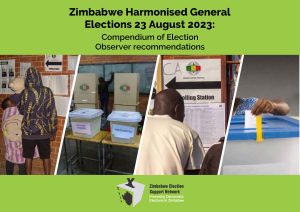4-FEBRUARY-2024 – In line with its mission to promote democratic free and fair electoral processes through objectively and impartially observing elections in Zimbabwe, the Zimbabwe Election Support Network (ZESN) observed the 3 February 2024 National Assembly by-elections. These by-elections were conducted in Chegutu West, Goromonzi South, Mkoba North, Pelandaba-Tshabalala, Seke, and Zvimba East. National Assembly vacancies arose following recalls of six (6) incumbent legislators.
The legislators who were all elected in the 23 August 2023 Harmonised Elections under Citizens Coalition for Change (CCC), were recalled by the party’s ‘interim Secretary General’ Sengezo Tshabangu who declared they had ceased to be members of the political party with effect from 14 November 2023 are; Addmore Chivero – Chegutu West; Stephen Chatiza – Goromonzi South; Amos Chibaya – Mkoba North; Gift Ostallos Siziba – Pelandaba-Tshabalala; Willard Tapfumaneyi Madzimbamuto – Seke and Oliver Mutasa – Zvimba East.
Legal Framework
Zimbabwe’s 2013 Constitution, the Electoral Act as well as Subsidiary and Subordinate legislation in the form of Statutory Instruments governed the conditions under which the by-elections were conducted. Section 39 (2) of the Electoral Act [Chapter 2:13] provides that, …after the President has been notified in terms of the said section of vacancies in the membership of Parliament, he shall issue a proclamation ordering a new election to fill the vacancies in the same manner, mutatis mutandis, as is provided in Section 38 of the said Act in regard to a general election. On 23 November 2023, President Emmerson Mnangagwa proclaimed the by-elections date through Statutory Instrument 235 of 2023, Proclamation 10 of 2023 in line with Section 46 (17) (c) of the Electoral Act [Chapter 2:13]. The proclamation ensured that the election date sat within the confines of the Zimbabwean Law as enshrined under Section 158 (3) of the Constitution which further mandates that any vacancy should be filled through a by-election within 90 days of the date in which the vacancy occurred.
